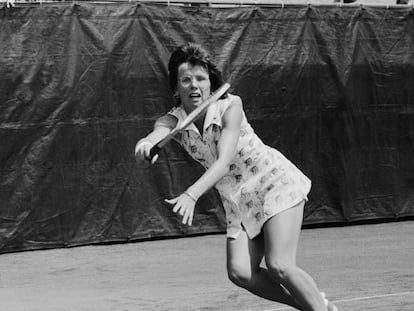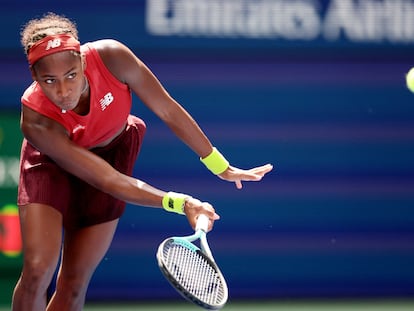Billie Jean King, pioneer of equality in sports: ‘The true power of women is starting now’
In 1973, this tennis player Billie Jean King stood up: either women and men would receive the same prize at the US Open, or she, the previous year’s winner, would not play. Fifty years later, her fight for the rights of athletes is more alive than ever
Billie Jean King does not miss a single detail in a meeting. The first contact with the interviewer takes place in London because “she likes to put a face to who she is going to talk to.” Once introduced, appointment two is consolidated for months later in New York, where everyone —media, fans, organization — demands her presence because it is a very special date: she celebrates half a century since she stood before the management of the US Open and insisted on equality. Men and women tennis players would receive the same prize, or she, the previous year’s champion and a great figure of the moment, would not play. Accustomed to winning, she came out victorious.
“Thank you for having fought so hard for this,” says the American Coco Gauff when she receives a check for three million dollars, the same amount as this year’s men’s champion, Novak Djokovic. “Billie usually gets her way,” the people around her joke, while the veteran athlete poses in front of this year’s Open poster. “And she has an agenda like Biden’s,” adds an assistant as she gets out of the van. King is accompanied by a small entourage led by her agent, Tip, a man with horn-rimmed glasses and the appearance of a sitcom actor. As soon as she identifies her interlocutor, she prepares to have a chat that lasts more than an hour. She wants to be sure that her message is clear. It is the message of a woman who raised her voice and rebelled at a time when dissent brought punishment. She was never very obedient, she says.
“Billie Jean teaches us that we have the possibility of choosing: we can remain silent, or we can take the step and fight. I wish we all had just a fraction of Billie Jean’s courage and tenacity,” Michelle Obama, with whom King shares a good friendship, praises her at the opening of the tournament. “She and Barack are good friends of mine, although I chat with everyone and meet a lot of people, including the Republicans,” she says before adding: “I don’t like the way our country is. It is too divided. We are too extreme now.”
Raised in a conservative California family, she quickly chose the opposite path. She became a great figure in world tennis, winning 39 majors, 12 of them singles, and took advantage of her platform to project a countercultural discourse: gender equality, homosexuality, civil rights. Married at the age of 22 to a man, Larry King — hence the last name she keeps, instead of her own, Moffitt, despite her divorce in 1987 — she immediately established herself as a firm activist. From the start, she led the Original Nine, the group of intrepid people who forever changed the history of their sport by getting the WTA — the body that governs the women’s circuit — to be founded and recognized as a counterweight to the absolute predominance of the ATP, in charge of male tennis. In 1973, she beat Bobby Riggs 6-4, 6-3 and 6-3 —”a woman’s natural space is the bedroom and the kitchen,” despised the man who had been number one in the 1940 s— in the iconic episode that became the 2017 film The Battle of the Sexes. The match brought together 30,000 spectators at the Astrodome Arena in Houston and 50 million television viewers in the U.S. alone.
King is one of the greatest institutions in terms of activism in sports. Her presence at the final ceremony of the last women’s soccer World Cup is not a coincidence. For her, “the fight never ends.” Now also engrossed in investment, she proudly directs the Billie Jean King Cup project, the competition that officially adopted her name in 2020 that takes place this week, from Tuesday October 7 to Sunday the 12th.
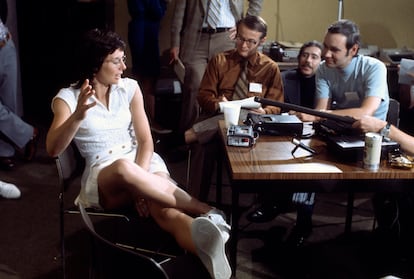
Q. Do you consider yourself a revolutionary? What is the origin of that spirit?
A. I am, but to a certain extent. I consider myself a leader who, if she has something on her mind and visualizes it, simply goes for it. I started playing tennis when I was 11, and at 12 I had an epiphany during some championships we were playing in Los Angeles. All the people who were there were white. They all wore white clothes and white shoes. The balls were also white. And I thought, “Where the hell is everyone else? Where are the black or Hispanic people?” It bothered me a lot, so from that moment I knew that I would dedicate my entire life to making sure that everyone could play tennis, a global sport that would also allow me to travel. I also wanted to professionalize it, because amateurism is a hobby, and if someone is very good they should be recognized as such. That was my dream for the sports, but also equality. Since I was little I wanted everyone to be inclusive, because we all should be.
Q. How did the coup of 1973 happen? You achieved what no one had achieved in any sport: for the first time, equal prizes for women and men.
A. I hadn’t planned it at all. But when I found out that [Ilie] Nastase had won $25,000 [in 1972] and I had won $10,000, I was furious. I went crazy. So I said I wouldn’t come back. I met with several companies and asked them, “Would you give us a hand?” Then the people in charge of Bristol Myers [deodorants] approached me and I went into shock. I told them: “Do you really want to do it?” I got the money to make up the difference and met with the director of the US Open, Bill Talbert. “Do you have it?” he asked me. And when I said yes, he got very quiet. The USTA board did not approve it, but the following year, he announced it on his own. I owe a lot to Billy. He was very brave. He and Bristol Myers believed in us, in women. They were men, but they had daughters, and that makes the difference. People think that this [equality] is only for women, but it is not. Men must be our allies. In fact, in my life there are men who have helped me a lot because, precisely, they have more power. It’s about us doing it together, as a community.
Q. The gap is narrowing, but where are we now?
A. Men are clearly still at the top. They have the power. The difference is huge. But as women begin to have more responsibility, things will be better for all of us. It will be a good business for them too. It’s hard on their egos, I know, but it’s all about education. It’s a cultural issue. It all depends on what they teach us from a young age. We girls are educated to be perfect, and that is impossible. We will never be good enough.
Q. Is this the definitive time for change?
A. It is. It’s time to change everything, and I think it’s happening because women have stood up and guys are starting to realize that they don’t always have to be brave, but that we have to help each other, not because of a gender issue, but because it should be that way.
Q. Is the energy of feminism today different from what you experienced in the seventies?
A. I think that social media plays a very important role today and that there are more people who feel part of the movement than in the old days, when we didn’t have phones and all that. I think there are a lot of girls today who are totally feminist. You know? I used to talk to Gloria Steinem, and I told her that they didn’t think enough about women’s sports; I told her that we trusted ourselves and our bodies, because we are strong and resilient, all those things they talk about. But they didn’t count on us, just as they didn’t count on the LGBTI community at the beginning. Now, women’s sports are at a turning point, and they are investing in us. The true power of women is beginning now, but this could not have happened if men had not been our allies. The problem is that they didn’t believe in us and they didn’t invest, but now they do.
Q. You, in fact, have invested in several sports in the United States: basketball, baseball, soccer...
A. Yes, in a few… I haven’t counted them [laughs]. In the Dodgers, for example. Sports are a platform, and people are starting to realize that women’s sport is a big investment. There are also more and more women investors. Maybe one day it will happen in Spain. Why not? Women investing, that’s it! We just announced an ice hockey league in the United States and Canada where the best in the world will compete. It is an exciting and fast sport. It is a lot like tennis.
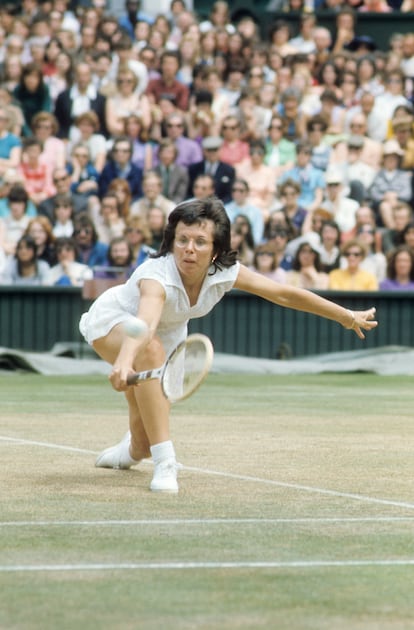
Q. Except that tennis is individual.
A. No no! It is not!
Q. No?
Q. People have the wrong idea. I love team sports because I grew up in them. In fact, I participated in the first edition of the Federation Cup in 1963. Everyone thinks that tennis is an individual sport, but it is not like that. It’s a team. You need those around you to win. You are not alone. What I like the most are the mixed doubles [boy-girl]; in fact, for four years I competed in that modality. The establishment didn’t want it, but it was the best. The best thing I’ve ever done, without a doubt.
Q. You have also made a strong bet on the Billie Jean King Cup.
A. We are going to bring together the best in the world in Seville. And I love Spain! So it’s going to be fun. There will be a lot at stake, and we want to grow, evolve. We are ambitious. Tennis is the healthiest sport in the world. But they [Davis Cup] started in 1900, and our competition started 63 years later, so friends: help us. Actually, it has been Mark Walter [owner of the TWG Global holding company] who has promoted our alliance with the ITF [the International Tennis Federation]. He owns tons of stuff and one day he said, “Let’s do it!” But behind him is also his wife, Kimbra. See? Men and women together! The ITF will still run everything, but we will take care of the commercial side. My wife, Ilana [Kloss, a former South African tennis player with whom she began a relationship 40 years ago], is the really smart one. She is the brain; I dream it and she builds it. She is very smart. Now we are thinking about doing something with soccer. More and more gay women are coming out in sports. Isn’t it great? Why doesn’t the same happen with men?
Q. I have my suspicions, but you tell me.
A. Because they still get nervous about how the rest of the guys will treat them if they say it. It’s still a stigma for them. It has always been said that being gay is being effeminate or being a tomboy, and that is not the case. Each individual is different. They fear not being accepted, and that is terrible. Some have come out of the closet. I remember a couple of rugby players… What were their names? Ian Roberts [Australian player] and Gareth Thomas [former Wales captain]. There’s also that Raiders football player, Carl Nassib. There are quite a few now, more than ever. Should they come out more? Of course, but I think we are going in the right direction. Jason Collins came out right at the end of his career [2013] and received a call from the president [Barack Obama] to congratulate him. He got a job in the NBA immediately. Things are really changing, believe me. In 1981, when I came out of the closet, I lost everything financially. And that doesn’t happen now.
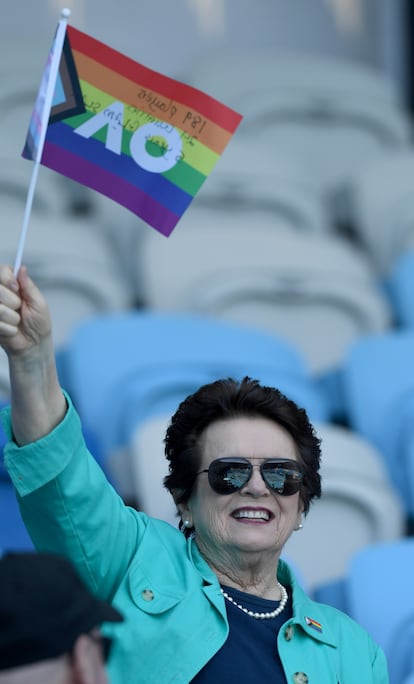
Q. Do you feel that today’s athletes are committed enough beyond sports?
A. Some are, and in some cases they have a strong commitment to social justice. But in the old days, we figures used to be mentors to those who came afterwards, and now that doesn’t happen. Nowadays, young players are thinking only about social media and winning the game, and that should change. Before we thought about us, and today’s generation thinks about the self. The ATP and WTA should work harder to better understand the history of our sport.
Q. You were a direct witness of what happened during the World Cup ceremony in Australia and New Zealand, of the non-consensual kiss of the former president of the Spanish Football Federation to Jennifer Hermoso. What do you think of it?
A. Spain won, but what did the media talk about afterwards? About him, the president [Luis Rubiales]. It’s always about the boys. The women deserved to be the stars. That should have been the headline, because winning is really difficult. But they couldn’t celebrate it enough. It’s sad. That man shouldn’t have done something like that. They should have been talked about first, and then the rest. It is a very important topic, so I am glad that it is reported, but victories must always be celebrated. We shouldn’t go through this kind of thing, right? But before this episode I had already heard that something was happening with the girls and the coach [Jorge Vilda], and I asked. Many of the players did not want to go to the national team because of him. They are a great example of commitment and unity.
Q. Speaking of unity, will we one day see the merger of the two tennis circuits?
A. Many professionals have been encouraging it for a long time. Everyone says it should happen, but in the end it never does. Why not take the final step? Because men have the money, and they always want more. We return to egos. In tennis, people wonder why the WTA doesn’t have as much money as the ATP, and it turns out we only get 5% of the media coverage. Oh really? If you watch a sports program, how much time is spent on the men and how much time is spent on us? We need to be grouped together. It will be beneficial for everyone. I have always believed it and I will always fight for it. I am very stubborn.
Q. Looking back, are you aware of the impact you have had?
A. I feel proud, but I don’t really like to think about the past. I prefer to focus on today and tomorrow. My goal is for as many boys and girls as possible to want to play tennis. In Spain, for example, I don’t think Conchita [Martínez] and Arantxa [Sánchez Vicario] are appreciated enough. They should be valued more, and there should be more girls following in their footsteps for everything they achieved. Every time we played against them and I was captain, we lost… [laughs]. I’m sure they don’t receive the same attention as the boys, or as Nadal, but we need them to be recognized so that the new ones follow their example. Then came Garbiñe [Muguruza], but we need more and more girls. They must have the same following and earn the same money as men, because that is the key: money. Money and enthusiasm. I don’t think many countries invest enough in women’s sports. We must change that, because girls and boys want the same thing: to be the best. My brother was a professional baseball player and I was a professional tennis player, and we always supported each other.
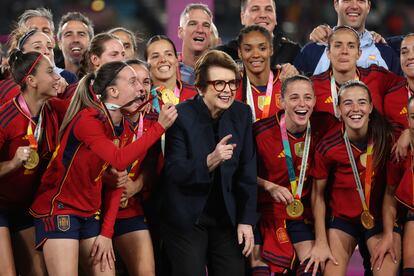
Sign up for our weekly newsletter to get more English-language news coverage from EL PAÍS USA Edition
Tu suscripción se está usando en otro dispositivo
¿Quieres añadir otro usuario a tu suscripción?
Si continúas leyendo en este dispositivo, no se podrá leer en el otro.
FlechaTu suscripción se está usando en otro dispositivo y solo puedes acceder a EL PAÍS desde un dispositivo a la vez.
Si quieres compartir tu cuenta, cambia tu suscripción a la modalidad Premium, así podrás añadir otro usuario. Cada uno accederá con su propia cuenta de email, lo que os permitirá personalizar vuestra experiencia en EL PAÍS.
En el caso de no saber quién está usando tu cuenta, te recomendamos cambiar tu contraseña aquí.
Si decides continuar compartiendo tu cuenta, este mensaje se mostrará en tu dispositivo y en el de la otra persona que está usando tu cuenta de forma indefinida, afectando a tu experiencia de lectura. Puedes consultar aquí los términos y condiciones de la suscripción digital.

